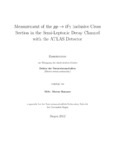Citation link:
https://nbn-resolving.org/urn:nbn:de:hbz:467-6765Files in This Item:
| File | Description | Size | Format | |
|---|---|---|---|---|
| rammes.pdf | 10.88 MB | Adobe PDF |  View/Open |
| Dokument Type: | Doctoral Thesis | metadata.dc.title: | Measurement of the pp -> tTy inclusive cross section in the semi-leptonic decay channel with the ATLAS detector Messung des inklusiven Wirkungsquerschnitts pp -> tTy im semi-leptonischen Zerfallskanal mit dem ATLAS-Detektor |
Authors: | Rammes, Marcus | Institute: | Fakultät IV - Naturwissenschaftlich-Technische Fakultät | Free keywords: | CERN, ATLAS-Detektor, Top-Quark, Photonkopplung, CERN, ATLAS detector, top quark, photon coupling | Dewey Decimal Classification: | 530 Physik | GHBS-Clases: | UHXO | Issue Date: | 2012 | Publish Date: | 2012 | Abstract: | The top quark, being the heaviest of the six quarks in the Standard Model of Particle Physics, had not been discovered until 1995. Hence, many of its properties could not be measured at a high precision or even not be investigated at all so far. Since the top quark is so heavy, it might play a special role in electroweak symmetry breaking (EWSB). Especially its coupling to the electroweak (EW) gauge bosons could reveal hints to New Physics, if there were deviations from the predictions by the Standard Model. The total cross section of the top quark pair production process with the additional emission of a photon (tTy) has been determined with the ATLAS experiment as a first measurement of the couplings of EW gauge bosons to the top quark, since this process provides the largest cross section compared to other EW couplings. The tTy cross section measurement has been performed in the semi-leptonic (e+jets and µ+jets) decay channel using a template fit method with 1.04 ifb of ATLAS data collected at a center-of-mass energy of sqrt(s) = 7 TeV in 2011. Various background sources have been investigated, using data-driven methods whenever possible; the impact of systematic uncertainties has been evaluated using a statistical ensemble of 3000 pseudo experiments. Das Top-Quark als schwerstes der sechs Quarks des Standardmodells der Teilchenphysik wurde erst 1995 entdeckt. Daher konnten viele seiner Eigenschaften nur unzureichend vermessen oder überhaupt noch nicht untersucht werden. Da das Top-Quark so schwer ist, könnte es eine besondere Rolle bei der elektroschwachen Symmetriebrechung spielen. Insbesondere seine Kopplung an die elektroschwachen Eichbosonen könnte einen Hinweis auf Neue Physik liefern, falls Abweichungen zu den Vorhersagen des Standardmodells auftreten würden. Der totale Wirkungsquerschnitt des Top-Quark-Paarerzeugungsprozesses mit der zusätzlichen Abstrahlung eines Photons (tTy) wurde mit dem ATLAS-Experiment als erste Messung der Kopplungen der elektroschwachen Eichbosonen an das Top-Quark bestimmt, da dieser Prozess den größten Wirkungsquerschnitt, verglichen mit den anderen elektroschwachen Kopplungen, aufweist. Die Messung des tTy-Wirkungsquerschnitts wurde mit Hilfe einer Template-Fit-Methode im semi-leptonischen Zerfallskanal (e+Jets und µ+Jets) mit 1.04 ifb im Jahr 2011 bei einer Schwerpunktsenergie von sqrt(s) = 7 TeV aufgezeichneten ATLAS-Daten durchgeführt. Verschiedene Untergrund-Beiträge wurden, nach Möglichkeit mit datengestützten Verfahren, untersucht; der Einfluss systematischer Unsicherheiten wurde mit einem statistischen Ensemble von 3000 Pseudoexperimenten ausgewertet. |
URN: | urn:nbn:de:hbz:467-6765 | URI: | https://dspace.ub.uni-siegen.de/handle/ubsi/676 | License: | https://dspace.ub.uni-siegen.de/static/license.txt |
| Appears in Collections: | Hochschulschriften |
This item is protected by original copyright |
Page view(s)
481
checked on Dec 27, 2024
Download(s)
155
checked on Dec 27, 2024
Google ScholarTM
Check
Items in DSpace are protected by copyright, with all rights reserved, unless otherwise indicated.

